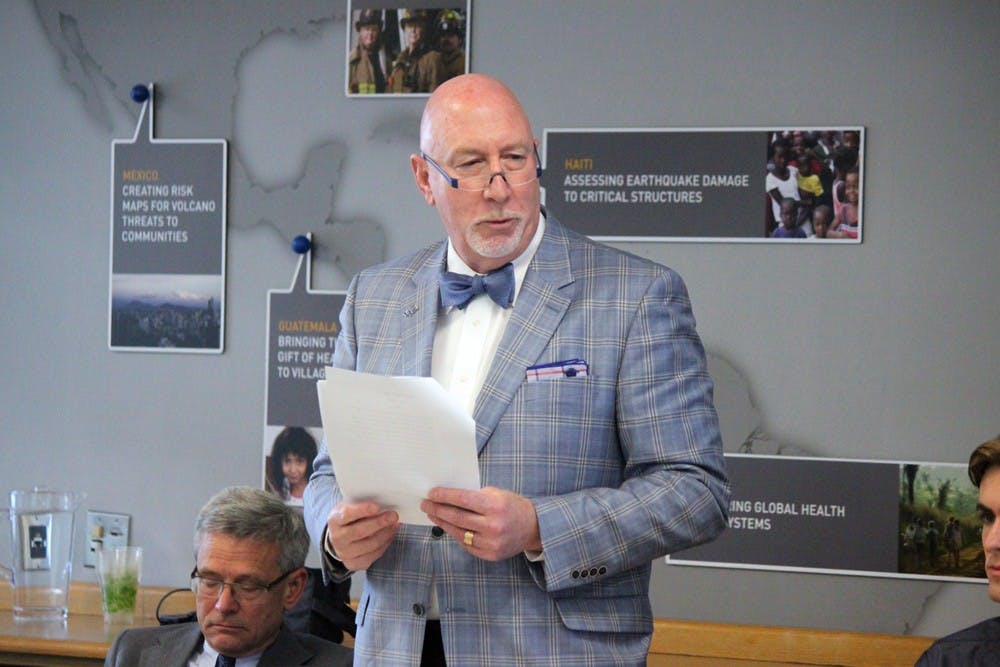Faculty Senate Chair Philip Glick is seeking transparency from the UB Foundation (UBF), but was “very disappointed” when the foundation rejected his request to add members to the foundation’s board of trustees.
UB Foundation Chairman Francis M. Letro denied Glick’s request for a faculty member, professional staff member and a student to be added to the board. The UB Foundation is a private entity independent from the university that controls $1 billion of UB donations. Letro said UBF was already transparent enough and therefore did not need additional representation.
Letro has not yet responded to The Spectrum.
UB faculty and organizations have called for an increase in UBF’s transparency over the years. Earlier this year, the UB chapter of the American Association of University Professors petitioned for the university and foundation personnel to release information about its expenditures.
Glick said he does not have any specific concerns about UBF’s transactions, but said there have been some concerns about UBF’s lack of transparency.
“I think the UB Foundation is really essential to UB’s success and it was just a way to reach out and try to help everyone,” Glick said. “I thought it was a win-win and we’re very disappointed by their decision.”
Glick’s proposal was supposed to be a compromise for not filing a Freedom of Information Act (FOIL) against the whole foundation, but allowing an ex-officio member of the faculty, professional staff senate and student assembly to be sitting in on all of UBF’s discussions while the board is deliberating.
“We could then walk out of the room and assure our constituents that we have no specific concerns about what’s going on at the UB Foundation,” Glick said.
Glick said although the foundation is “not related to UB at all,” UB has become so dependent on the foundation.
“The amount of state funding is going down, like everything else in the world, expenses keep going up,” he said. “Tuition has been capped and so in order to sustain our mission, we’re more and more and more dependent on the foundation.”
UB President Satish Tripathi sits on the UB Foundation board and Letro believes the foundation practices shared governance because the president sits on the board, according to Domenic Licata, Professional Staff Senate chair.
“That’s Mr. Letro’s view,” Licata said. “Our view is the president does not represent the university community in the same way. Certainly he is at the top of the representative of our university, but he does not represent the university in the way that elected governance leaders do.”
The chairs of the Faculty Senate, Professional Staff Senate and Student Association Senate are elected to represent the views of the university.
“We were trying to include shared governance in the governance of the UB Foundation and one of the values of shared governance is total transparency because when you communicate with trust and total transparency, things tend to move forward,” Glick said.
Shared governance is the concept of large, complex educational institutions having all five pillars of governance at the table for every major decision, according to Glick.
The five pillars of governance include students, faculty, professional staff, administration and the various councils and boards, Glick said.
The UB Foundation, UB Council and Alumni Association are examples of said councils and boards.
Glick said shared governance is not only based on transparency, but also honesty collaboration and “making sure that all the stakeholders’ opinions have been heard before any decisions are actually made.”
Flexibility is also another important tenet of shared governance, he said.
Glick doesn’t want any energy to be wasted on conspiracies or rumors. He instead wants that energy to go toward “making the university a better place” for the students, professional staff, faculty and community.
UBF is very careful to “be proper” about their actions, Licata said.
“President Tripathi has expressed that the foundation is an independent entity and independent of UB and what we are asking for really is a fairly significant change in the status quo,” Licata said. “Dr. Glick and I in our terms as chairs in our respective senates have really pushed for the idea of shared governance.”
Licata believes every decision made that affects the mission or identity of the university should be done with input from everyone who is affected.
Members of the Faculty Senate had mixed reactions to Glick’s proposal.
“I think I’ve read in other news organizations that there’s still some faculty members that are very unhappy about this,” Glick said. “When you represent 1800 faculty members you just can’t make everyone happy, but this was an effort to try to make the majority of the people happy and to represent them.”
The Faculty Senate has changed its bylaws so that staff and students are represented on the executive committee. The Professional Staff Senate is currently working on an amendment that will allow faculty and students to sit on the staff executive committee, according to Licata.
“There were no bridges burned and if in the future the UB Foundation wants to reach out to us again, we would consider our offer again,” Glick said. “We would have to reevaluate everything and the time and the circumstances.”
Ashley Inkumsah is the co-senior editor and can be reached at ashley.inkumsah@ubspectrum.com





